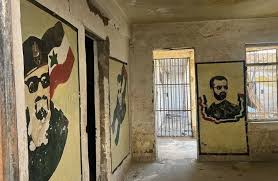As Syria prepares for a high-profile return to the Arab stage—with President Ahmad al-Sharaa expected to attend the upcoming Arab League summit in Baghdad—serious questions persist regarding the transitional government’s regional standing, unresolved legacies of repression, and the lack of coordination with neighboring states.
No Security Coordination with Damascus, Says Iraq
Iraqi Interior Minister Abdul Amir al-Shammari confirmed on Tuesday that there is currently no security coordination between Baghdad and the Syrian Ministry of Interior, despite Syria receiving an official invitation to the summit scheduled for 17 May. Speaking to Al-Arabiya and Al-Hadath, Shammari noted that no Syrian delegation has contacted Iraq to prepare for Sharaa’s visit and that “border crossings with Syria remain closed.”
He added that large portions of Syria’s eastern border are under the control of the Syrian Democratic Forces (SDF), not the Damascus government, complicating prospects for joint border security. Iraq has reportedly completed major fortifications along its border to guard against infiltration by extremist groups, which remain active in parts of Syria despite the regime change.
These comments reflect ongoing Iraqi caution. While Prime Minister Mohammed Shia al-Sudani has described Syria’s participation in the summit as essential for presenting its new national vision, security officials remain unconvinced by the transitional government’s stability or capacity to enforce order.
Lebanon Pushes for Accountability on Missing Citizens
Simultaneously, Lebanon is renewing pressure on Syria to resolve the long-standing issue of hundreds of Lebanese citizens who disappeared in Syrian custody during the Assad era.
Lebanese Foreign Minister Youssef Raji met this week with the National Commission for the Missing and Forcibly Disappeared, reaffirming that the file is a top diplomatic priority. The Commission called for full government support and for its inclusion in the planned Lebanese–Syrian joint committee tasked with handling outstanding bilateral issues.
Raji pledged to raise the matter directly with his Syrian counterpart, Ahmad al-Shibani, and confirmed that a formal case file is being prepared in coordination with Lebanon’s Ministry of Justice. He emphasized the need to treat the file as a humanitarian cause, separate from political disputes—a stance widely shared by families of the missing and human rights advocates.
Syria has reportedly expressed willingness to cooperate, as part of a broader effort to normalize ties with Arab neighbors. During Lebanese Prime Minister Nawaf Salam’s recent visit to Damascus, discussions reportedly included mechanisms to address contentious issues, including the missing persons file.
Calls for Reparations and Transparency
Beyond clarifying the fate of the missing, Lebanese voices are also demanding reparations for those who endured prolonged detention in Syrian prisons. Rights advocate Reda Murad, Lebanon’s representative to the Arab League’s human rights committee, has called on the Syrian government to compensate all Lebanese detainees who suffered under the Assad-era apparatus.
The case of Suhail Hammoui—a Lebanese national recently released after 32 years in Syrian detention—has attracted particular attention. Murad urged the Lebanese government to provide him with a permanent stipend and treat his case as a model for reparative justice. She added that Damascus bears legal and moral responsibility for compensating all Lebanese victims of enforced disappearance and arbitrary detention.
Estimates of the number of missing Lebanese in Syria vary widely, ranging from 700 to over 6,000. The lack of a unified list highlights the absence of a comprehensive investigation and the need for a verified and transparent accounting process.
Symbolism Meets Skepticism
While the Arab League summit in Baghdad is being billed as an opportunity for Syria to re-enter regional diplomacy, observers caution that symbolism alone cannot erase years of unresolved grievances. For Iraq, the summit represents a bid for regional leadership; for Syria, it is a rare opportunity to rebuild trust. Yet the lack of security coordination and growing human rights demands from Lebanon highlight just how fragile Syria’s re-engagement remains.
Ultimately, the success of Syria’s diplomatic return will depend not on protocol or appearances, but on its willingness to confront its turbulent legacy, restore order, and engage in transparent dialogue with its neighbors.
This article was translated and edited by The Syrian Observer. The Syrian Observer has not verified the content of this story. Responsibility for the information and views set out in this article lies entirely with the author.


